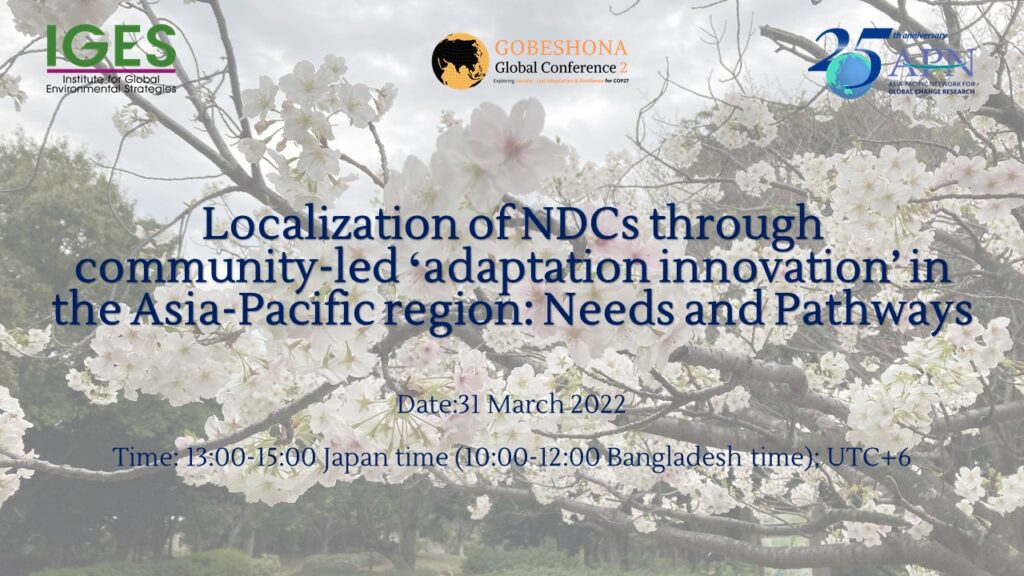
31 March 2022—The Institute for Global Environmental Strategies (IGES) and APN jointly organized a session titled “Localization of NDCs through community-led “adaptation innovation” in the Asia-Pacific region: Needs and pathways” at the Gobeshona Global Conference 2 on 31 March 2022. The session comprised audience engagement with Mentimeter, breakout sessions responding to key questions and panel discussion.
Speakers:
- Dr Chi Huyen Truong, Programme Coordinator, Himalayan University Consortium, International Centre for Integrated Mountain Development (ICIMOD), Nepal
- Dr Hoon Chang, Thematic Climate Advisor at United Nations Capital Development Fund (UNCDF), Thailand, and Former Director, Korea Adaptation Center for Climate Change (KACCC), Korea Environment Institute (KEI), Republic of Korea
- Prof. Mizan R. Khan, Deputy Director, International Centre for Climate Change and Development (ICCCAD), Bangladesh
- Ms Ofa Ma’asi-Kaisamy, Manager, Pacific Climate Change Centre, Secretariat of the Pacific Regional Environment Programme (SPREP), Samoa
- Prof. Patrick Nunn, APN Capacity Development Committee, University of the Sunshine Coast, Australia
- Ms Vositha Wijenayake, Executive Director, SLYCAN Trust, Sri Lanka
- Dr Yuki Yoshida, National Institute for Environmental Studies (NIES), Japan
Key points from speakers:
- The Asia-Pacific is a diverse region where adaptation plans need to be tailored to individual countries and regions as one size does not fit all.
- There has been a paradigm shift from top-down to bottom-up in developing and implementing adaptation plans, creating “local-centric policies” and generating a sense of ownership. That said, there is still a lack of information and technology to assess future climate projections, the leadership of governments and public interest etc.
- Need to combine global knowledge and local knowledge to implement adaptation plans effectively. At the same time, empower local communities as they underestimate themselves and wait for external support.
- Adaptation technologies need to be affordable and usable at the local level. Need to use local languages and build the capacity to enable local uptake and application.
- To effectively implement adaptation plans, partnerships need to include all stakeholders in the community, such as youth, women and entrepreneurs etc.
Key takeaways from the end of the session:
- Co-creation of knowledge and solutions is key to facilitating effective and sustainable adaptation action.
- Capacity-building should not be one-off, rather, it needs to be like friendship, and a continuation of the partnership should be ensured.
- We need affordable and contextualized technology to ensure workable locally-led adaptation (LLA) practices.
- LLA has to be a part of NAP and NDC implementation to establish effective linkages with national and international policy processes.
- We need a phase wise approach under a long term planning and sustained partnership to truly realize LLA potential for a paradigm shift to transformative adaptation.
